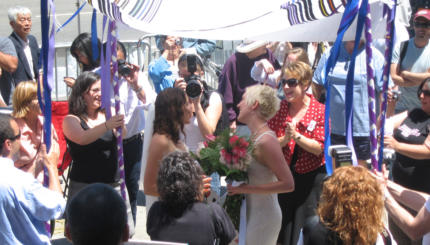Bashert (pronounced bah-SHARE’T) is a Yiddish word that literally means “destiny.” Though it can be used to refer to any fortuitous event perceived to be divinely ordained, it is most commonly used in reference to finding one’s soulmate. The word can be used both as an adjective (to describe a match as being bashert) and as a noun. It’s not uncommon for Jewish singles to say they are “looking for my bashert.”
Though the word bashert itself is of relatively recent origins (its precise etymology is unclear) and does not appear in any ancient Jewish texts, the concept of marital destiny — of matches made in heaven — goes back at least to the Talmud (Sotah 2a), which includes this teaching: ”Rav Yehuda says that Rav says: Forty days before an embryo is formed a divine voice issues forth and says: The daughter of so-and-so is destined to marry so-and-so.”
The notion of a destined partner is found in other texts as well, including this well-known story from the Midrash.
A Roman matron asked Rabbi Yosi ben Halafta, “In how many days did God create the world?”
He said, “In six, as it is said, ‘Since six days God made…’ (Exodus 20:11)
“And since then,” she asked, “what has God been doing?”
“God sits [on the Heavenly Throne] and makes matches: the daughter of this one to that one, the wife [i.e. widow] of this one to that one, the money of this one to that one,” responded R. Yosi.
“And for merely this you believe in Him!” she said. “Even I can do that. I have many slaves, both male and female. In no time at all, I can match them for marriage.”
R. Yosi, “Though this may be an easy thing for you to do, for God it is as difficult as splitting the Sea of Reeds.”
Whereupon, Rabbi Yosi took his leave. What did she do? The matron lined up a thousand male and a thousand female slaves and said you marry you, and married them all off that night. The next day, one slave had his head bashed in, another had lost an eye, while a third hobbled because of a broken leg. She said to them: “What happened to you?” and they each said to her: “I don’t want this one” [with whom you matched me].”
Immediately, she sent for and summoned R. Yosi and she said: “There is no God like your God, and your Torah is true, pleasing and praiseworthy. You spoke wisely.”
The story can be read as an endorsement of the idea that everyone has a bashert determined by God and that marriages left to human hands will be unpleasant ones. Alternatively, it can be read as an acknowledgment that marriage is hard work and we must choose our partners wisely.

Help us keep Jewish knowledge accessible to millions of people around the world.
Your donation to My Jewish Learning fuels endless journeys of Jewish discovery. With your help, My Jewish Learning can continue to provide nonstop opportunities for learning, connection and growth.
The notion of predestination, whether of marriages or anything else, presents a host of theological problems, and not all Jewish authorities have accepted the idea that marriages are preordained. The same talmudic passage featuring the teaching cited above includes a different opinion stating that a woman is matched to a man “only according to his actions,” which suggests at least some degree of human agency in the selection of a mate. Maimonides explicitly rejected the notion of a preordained soul mate, claiming that if it were real, the biblical prohibition on an engaged man going to war because he might die and another man marry his intended would be unnecessary. If God had ordained the marriage, Maimonides reasoned, there should be no fear of the man dying before he could consummate it.



